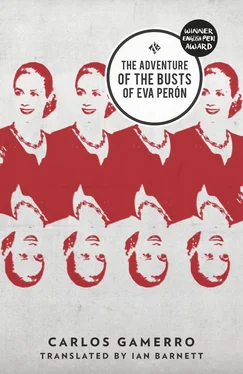‘Oy, you… What you writing?’
Before looking up, he instinctively tried to finish the sentence he was on, which turned into a black scrawl when a hand landed on his arm and gave it a violent tug.
‘Comrades! I got a pig here! A grass!’
Giving him no time to explain, half a dozen strapping proletarian hands had pinned down his arms and shoulders, and a dark-complexioned man in a blue helmet and thick, black-framed glasses was scanning his notes with a calloused finger, spelling out each word with his lips.
‘It’s all here, comrades. We’re all down here, one after another. Got ourselves an informer here we have, boys and girls.’ Then, bringing his face to within centimetres of Marroné’s, ‘Who sent you, Cerbero or the pigs?’
‘No, no,’ stammered Marroné, overcome at the absurdity of the mistake. ‘I read How to Win Friends and Influence People , I’m trying to please others…’
A hand closed over his face and he could no longer speak or see. It wasn’t so much fear he felt as befuddled outrage. Had he been spared death in the crossfire yesterday only to get lynched over a ridiculous blunder?
‘Now then, comrades, calm down, comrades…’
Marroné realised they had let go of him when his struggles met with no further resistance than gravel and air. He opened his eyes to see a worker in a white helmet — at last! — squatting studiously over him, his body blocking out the sunlight, his face encircled by a corona of flame-red locks. A second later Marroné’s eyes had adjusted and taken in his features too.
‘So, matey, what’s all this the comrades are saying about a notebook?’ the worker began, with quiet authority. If Marroné had had any doubts, the voice did away with them.
‘Paddy? Paddy Donovan?’
The panic shifted, lodging itself for an instant in the newcomer’s honey-coloured eyes as his milk-white skin reddened to rival his hair. He pulled himself together with a visible effort and gave him a jaunty smile, which he immediately bestowed on the rest of the audience.
‘Must be mistaken there, chief.’ Then, to the others, ‘Hey, if this one’s from the secret service, he should be sent back to spy school.’
Marroné had sat up and was mechanically dusting off the plaster that covered his jacket and trousers — and no doubt his face too — thinking it might be preventing Paddy from recognising him. All the anxiety of the situation had dissolved into stupefaction at such an improbable reunion.
‘No, no, I’m certain,’ he insisted with a smile. ‘It’s me, Ernesto, Ernesto Marroné, we were at St Andrew’s together, remember? I used to sit at the desk behind you. We used to play rugby together; you were in Monteith and I was in Dodds.’
For a second he toyed with the idea that Paddy had lost his memory in a car crash and, having been rescued by a working-class family, now took himself for one of them. Perhaps he needed more basic sensory stimuli.
‘Monteith, green shirts? Dodds, yellow shirts? The scrum? “Push, St Andrew’s, push!”’
Fists pumping the air, Marroné froze in mid-war cry. Struck dumb, Paddy’s eyes were on him, but the other workers, half-puzzled, half-wary, had fixed theirs on Paddy, who this time spoke with less conviction, almost tripping over his tongue.
‘I… I… dunno what you’re t… talking about, chief.’
Unable to tell if his friend’s eyes were shining with confusion or entreaty and making the most of the fact that his exhortations, if failing to restore Paddy’s memory, had at least led the others to suspect they were dealing with a harmless loon rather than a dangerous intelligence agent, he decided to beat a hasty retreat.
‘I’m sorry. My mistake.’
Smiling insistently he backed away until he reached the statue of Moses at the entrance gate and sat down in its shade to study the man he had taken for his old schoolmate. The two were as similar as the replica now looming over him was to the original…
If Marroné had one hero in his youth, it was Paddy Donovan, whom the eye of memory always haloed with light in a sunny postcard of the rugby pitch; it was as if fate itself had made him captain of the green house of Monteith just to set off the blaze of red upon his head, and the games against Monteith were the ones Marroné always found hardest to win, at least until fourth year, when Paddy Donovan, to the despair of directors and trainers, abandoned rugby for the more plebeian football team, a symbolic gesture he would complete in fifth year by handing back the brown and turquoise prefects’ tie in favour of the navy-blue and silver stripes of the regular school tie. Paddy, the first to smoke marijuana. Paddy, who wrote articles for the school magazine that the school authorities had invariably to censor. Paddy, who bedded the rector’s daughter, a petite, liberated English blonde everyone wanted but nobody dared. They hadn’t been friends, exactly, though less out of reticence on Paddy’s part than timidity on Marroné’s. The latter had never felt altogether worthy of such a friendship, a feeling that perhaps dated back to an episode in first grade, when, alone in the classroom, Marroné had amused himself by taking coloured chalk to the homework written on the blackboard — thinking it would please Miss — turning the drab white letters into pretty rainbows. But the scowling teacher demanded the culprit reveal his identity, and Marroné, paralysed and dumb on one of the desks at the back, found himself incapable of uttering the words of explanation. When she threatened to take away their trip to the cattle show at La Rural, Paddy Donovan, who had already cast two or three suspicious glances in his direction, raised his hand and confessed to the crime. The teacher thanked him for his honesty and gave him no other punishment than to clean the blackboard, which only further aggravated Marroné’s sense of guilt: he’d behaved like a coward and let someone else pay, and all for the sake of an insignificant risk. He never admitted the truth to Paddy, so he could never thank him for stepping into the breach, and the suspicion that he knew and, out of delicacy, hadn’t pressured him into speaking up, filled him with gratitude and bitterness in equal parts. On another occasion, when they were at seventh-grade summer camp, Marroné had been the victim of a case of quite gratuitous and unjustified bullying: he had accidentally set fire to a sixth-grader’s tea towel and, just to annoy him, all the younger boy’s companions, fired up by the impunity of the mob, had taken the side of the crybaby and set upon him — all except Paddy, who had sent them packing with a few choice words; and once again Marroné was unable to find the words to thank him. As soon as he had finished school, Paddy had gone away for a year to travel the world and Marroné had heard nothing more of him than the occasional rumour, which included all the forbidden words: hippies, drugs, communes and attempted suicide. They hadn’t seen each other again, as Paddy never attended the annual old boys’ dinners at the Claridge Hotel, but word reached them that on his return Paddy had settled down, studied law, carved out a career in his father’s business and married a model who was on TV… No, Marroné concluded, he was seeing things, hearing things: this couldn’t be his old classmate, not this red-headed proletarian striding towards him after sealing what looked like a challenge or a wager, exchanging a high-five with the blue-helmeted worker in glasses.
‘Look,’ Marroné began, ‘I swear I didn’t mean to…’
‘It’s me, you arsehole,’ muttered Paddy out of the corner of his mouth, with his back to the group so his face wouldn’t be visible. ‘What are you trying to do? Are you trying to ruin me? I’ve told them I’m playing along with you to find out who you are.’
Читать дальше











